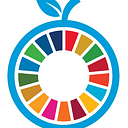2021 is going to be a bad year for world hunger
By Gernot Laganda, PROC, Chief of Climate and Disaster Risk Reduction Programmes, United Nations World Food Programme
How climate action can make a difference
On 9 October 2020, as it was announced that the Nobel Peace Prize 2020 would be awarded to the UN World Food Programme, many WFP teams across the world were concerned about the latest data from the field. Assessments showed upticks in hunger in communities that had been doing well only a year ago, and meetings with governments were being scheduled to discuss preparedness plans for a difficult year ahead.
While the award came as a strong acknowledgement of the work WFP is doing to combat hunger and prevent it from being used as a weapon of conflict, the distinction was tempered by the knowledge that humanitarian needs are rising faster now than at any other time in the 21st Century. In 2019, 688 million people had been chronically undernourished, and 135 million people had been driven into life-threatening situations as a result of conflicts, climate or economic shocks. Today, WFP’s live Hunger Map aggregates 957 million people across 93 countries who do not have enough to eat. The Global Humanitarian Outlook projects 239 million people in need of life-saving humanitarian action and protection this year.
Numbers are driven by a toxic intersection of several crises. Where the COVID-19 pandemic meets rising urbanization, globalization and environmental degradation, economic recessions and poverty ensue. These new vulnerabilities clash with a global climate emergency that adds increasingly severe weather shocks and stresses to the equation. Climate extremes do not only undermine the pandemic response and economic recovery — they also aggravate resource scarcity and displacement which, in turn, fuel social and political tensions that can discharge as violence and conflict.
While the emergence of the coronavirus in 2020 has reshaped our lives, the world has also grappled with one of the hottest years on record. Along with devastating heatwaves and wildfires, there have been floods, storms and city-sized locust outbreaks. Despite great operational capacities to save lives after such emergencies, agencies such as WFP are under no illusions that emergency aid can ever be enough to manage the escalating humanitarian needs of the 21st Century.
In January, WFP was among signatories to an open letter to G7 Leaders, which said: “Every day we each take precautions in our own lives. We wash our hands or wear a mask. We try to save for an uncertain future, or we buy insurance. We must now apply this common sense at a global level.”
Of the factors driving global hunger, climate is the one that can best be predicted using science. Our technical abilities to monitor and forecast weather-related hazards have never been as good as today. There is no ethically justified reason to keep treating climate disasters as inevitable and ‘natural’ surprises. As countries are re-grouping to think about ways in which the COVID-19 crisis can be used as a springboard to build more resilient societies, climate foresight and preventive planning need to be part of the equation.
In the past year, 40 WFP country offices have engaged in a strategic dialogue with their host governments about climate risk management in food systems. In tandem with their ever-present readiness to deliver humanitarian response, these country offices have doubled down to help strengthen social safety nets with climate risk insurance solutions. They have also arranged preventive cash transfers based on weather forecasts, and helped governments to mobilize climate funding to increase the climate resilience of food systems in the most vulnerable contexts.
Today, many countries have started to recognize the global climate emergency as a humanitarian issue. Climate change fuels conflict and economic risks, while compounding the effects of disease outbreaks. Like COVID-19, it is highly globalized and dynamic, and cannot be contained by one country, one institution or one academic discipline. It requires countries and organizations to work together to identify and implement solutions.
Some of these solutions are emerging from new angles and directions, for example as part of a new global dialogue about food systems. WFP’s involvement includes anchoring the Resilience Action Track of the 2021 Food Systems Summit to discuss game-changing approaches for the transformation of imperiled and unsustainable food systems. This is an opportunity to address the interconnected problems of climate disruption, environmental degradation, food waste and unhealthy diets, which affect countries all over the world, including Spain and G7 countries. These might have stronger economies to cope with the impacts of some of those problems, but they also feel the burden of how the climate crisis is impacting the rest of the world — such as through the growing flow of climate refugees and the rising prices for certain agricultural imports.
In November, the experiences from WFP’s climate action programmes will be shared with delegates at the UN Climate Change Conference (CoP26) in Edinburgh. By that point, thousands more lives will have been threatened by climate extremes, and it will again be apparent that climate change has become an urgent humanitarian issue. Organizations such as WFP will have kept working to save lives — looking for ways to reduce the need for humanitarian aid over the long term. Whether this will be possible will depend on many factors — but it certainly includes a stronger focus on foresight and anticipation so that predictable climate emergencies can be prevented.
About the Author: This article has been sent in by Gernot Laganda, PROC, Chief of Climate and Disaster Risk Reduction Programmes, United Nations World Food Programme.
The views and opinions expressed in this blog are those of the author and do not necessarily reflect the official policy or position of the United Nations Food Systems Summit.
